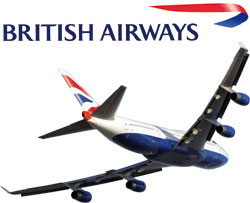British Airways, Iberia agree merger
 London - British Airways and Spain's largest airline Iberia agreed to a merger forming the world's third-biggest airline, both companies announced late Thursday.
London - British Airways and Spain's largest airline Iberia agreed to a merger forming the world's third-biggest airline, both companies announced late Thursday.
The merger, which was agreed after 16 months of negotiations, is to be completed by the end of 2010, keeping both brands in operation. British Airways (BA) would control 55 per cent of the combined airline with Iberia holding 45 per cent.
The link-up would be the biggest consolidation in the European airline industry since the 2004 merger of French carrier Air France and KLM, the Dutch airline, on which it is modelled.
The two sides hope to save a combined 400 million euros (598 million dollars) annually. They would have a total of 419 aircraft serving 205 destinations. The pair had a combined 62 million passengers in 2008.
The joint statement said the airlines believe "there is a compelling strategic rationale for the transaction, which is expected to generate annual synergies of approximately 400 million euros (598 million dollars) and benefit both companies' shareholders, customers and employees."
The new airline will be the third-biggest in the world after Air France/KLM and Germany's Lufthansa. BA and Iberia, which are both loss-making, have said the tie-up will give them the strength to survive and withstand the current economic downturn.
Both carriers are members of the One World alliance, which already allows them to sell seats on each other's flights.
Iberia President Antonio Vazquez will chair the company, which will be headquartered in London, while BA's Willie Walsh will become chief executive of the group.
Ahead of the agreement, shares in Iberia soared by more than 12 per cent on the Madrid stock exchange. In London, BA shares rose by around 8 per cent.
The companies have been considering a merger since the summer of 2008.
BA last week announced a record half-yearly pre-tax loss of 292 million pounds (485 million dollars), following a record annual loss of 401 million pounds in the previous financial year.
Iberia's recent results showed losses of 165 million euros (247 million dollars) for the first half of 2009.
In October, the Spanish airline presented a cost-cutting programme including job cuts and salary freezes over the next two years.
Iberia cabin crew staffers are staging pay strikes from October to December, which caused nearly 400 flights to be cancelled on Tuesday and Wednesday.
Iberia has announced the creation of a new subsidiary focusing on local and continental flights, allowing the mother company to put more emphasis on Latin American destinations.
Iberia, which was privatized in 2001, has a fleet of more than 200 aircraft flying to about 200 destinations in 46 countries. The airline schedules about 1,000 flights daily.
Iberia transported more than 33 million passengers in 2008, down 7 million from the previous year.
The two airlines have negotiated "agreed spheres of interest," with Iberia concentrating on services to Latin America and Africa while BA would focus on routes to the Middle East and Far East.
Under the proposals, BA will gain an additional 59 destinations, of which 13 will be in Latin America, while Iberia will fly to 98 new destinations across the BA network.
The link-up will require regulatory approval from the European Commission, but experts believe that is likely to be granted following the success of the Air France/KLM merger.
Richard Branson, head of British rival Virgin Atlantic, Thursday called on the competition authorities to investigate the "dominant" role of the proposed new European carrier.
BA's problems have been compounded in recent years by high fuel costs, spiralling staff and pension costs and intense competition from budget airlines.
Walsh's business plan of focusing on wealthy business class travellers was largely seen as a failure, with customers turning to cheaper options in a recession.
Walsh responded to the crisis with a major cost-cutting and redundancy programme, resulting in the loss of 4,900 jobs by March, 2010. BA has a staff of nearly 39,000 worldwide.
This summer, BA employees were asked to work for free for a month as unions were urged to agree to a pay freeze. Trade unions representing cabin staff have threatened strike action that could hit the British carrier just before Christmas.
Aviation analysts in London had linked Walsh's survival at the head of BA to his ability to turn around the airline's fortunes. (dpa)